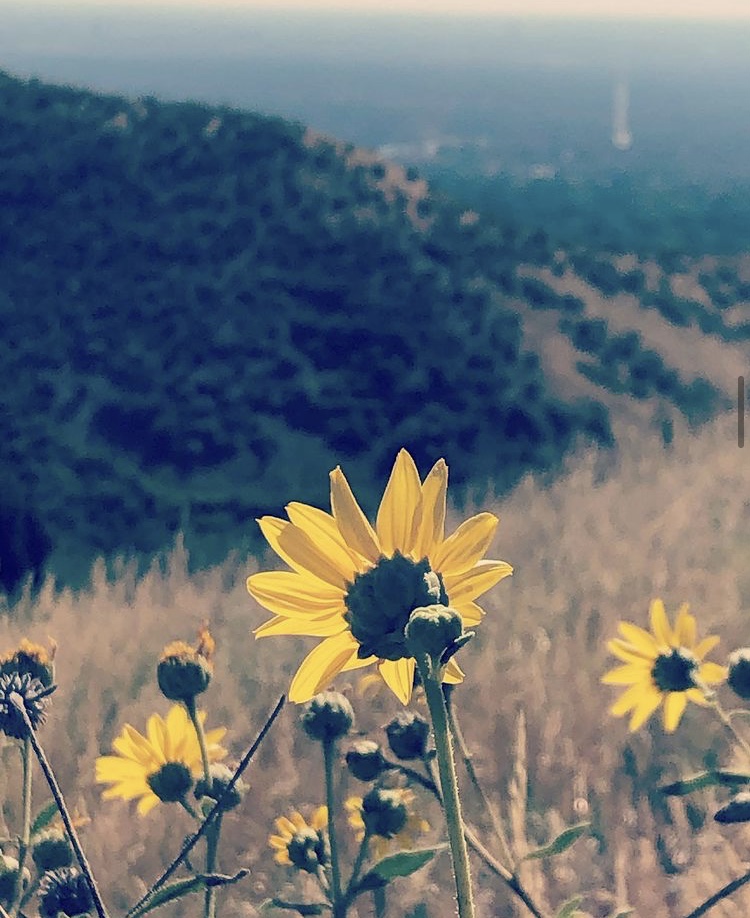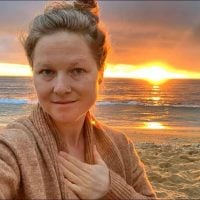
The following article is an excerpt from Anna Palmer’s book, Coming Home: Healing From an Eating Disorder by Finding Beauty in Imperfection. May the words here grant you deeper permission to come home to the fullness of yourself, humanness, divinity, and all. Welcome home.
~
Chapter 18. What Does Freedom Feel Like? A Pleasurable Life Is Happening Now
“I want you to know that it is pleasure, not pain, that is your birthright.” ~ Christiane Northrup, MD
When you hear or read the word “pleasure,” what do you feel? Some of us immediately resort to our conditioned beliefs. We think pleasure is related only to certain things, such as sex, food, a massage, touch from a loved one, or perhaps eating a decadent dessert.
Pleasure is a word that gets little mention in our productivity-based, goal-oriented culture, and also carries a whole lot of taboo. We denote it with purely sexual activities. For those raised in a religious setting (“purity culture”), pleasure may feel taboo, shameful, sinful, and forbidden.
Beliefs begin in childhood. We develop our core beliefs about life and our worldview based on our upbringing. Even if we weren’t raised in Judeo-Christianity or Catholicism (two big religions of Western society), as a collective, we still receive conditioned programs, in some way, shape, or form.
The beliefs we adopt (unknowingly) exist in the subconscious mind and drive our choices and behavior. Our subconscious beliefs (whether true or not) can also exist in discord to our actions, creating inner conflict or dissonance. Even years after childhood, we continue to feel the reverberations of these beliefs, no matter if we consciously believe them as adults or not.
One belief from most Christian traditions is that sex is reserved for marriage alone and is only sanctioned between a man and a woman. Sex is a taboo topic that you are encouraged to stay far away from. Basically, sex is dependent upon you finding a man or woman to marry, preferably one who shares your faith. Thus, the power to experience pleasure lies in another person choosing you (or not).
According to this oppressive template of belief, if you dare to explore your sexuality before marriage, you are committing a sin. Even having sexual thoughts or fantasies can be deemed as having a sinful nature. We are meant to be pure and we are dirtied, tainted by sex, say man-made religions. Especially as women, pleasure and self-pleasure are taboo and “off-limits.”
We are told from an early age that masturbation is only what the boys do. So, as women, we are conditioned to think sex is “dirty,” which means if we think about it or enjoy it, we’re “dirty.” We may grow up feeling intense shame and guilt about masturbation and about our sexuality, which translates to feeling dirty and ashamed of ourselves, our bodies, and our natural desires.
I prescribed to this faulty, oppressive belief for many years. I believed that making myself feel good sexually was dirty and shameful, even though as a child it came so naturally to me (and for most children it does). I remember my siblings walking in on me on occasion alone in my room and seeing their disgust and shame from their own conditioning directed toward me and my behavior of self-pleasuring. I felt immense humiliation, embarrassment, and shame.
The message was received loud and clear: making yourself feel good is “bad.” Self-pleasuring was not only taboo but seen as dirty and gross (especially in our culture around women masturbating). It would take many years into my adulthood to rectify this false belief in myself and reclaim my sexual self more fully and wholly.
“Purity culture,” the religious belief that women, especially, need to stay virgins and keep themselves pure before God and union with a man, and only a man, infiltrated most of my life and choices for my early adult years. I even took a purity vow (to myself) and sported a purity ring up until my late teens.
Just to be clear, I do not think there’s anything wrong with waiting for the right person whom you love and who loves you and until that deep commitment and trust are earned. I didn’t consciously prescribe to the belief that sex was sinful. I did feel, however, that sex was sacred and special.
I have sought to understand what sex and pleasure mean for me outside of religion. As the imperfect person I am, I have also learned the hard way when I have not honored myself in exchange with another. Once I decided to trade in my v-card at the ripe age of 21 (with a trusted partner), sex became an easier exchange to feel validated and worthy.
Sex became a way to feel, even if the connection was shallow and short-lived. I engaged mostly with emotionally unavailable partners or those lacking the desire or ability to commit. I couldn’t understand what I was doing wrong.
Moving away from the belief that sex is sinful, I have returned to the deeper truth (for me) that sex is sacred. I don’t believe you have to wait until you are married, but I do believe it is a special exchange of energy between two people that should be done with consciousness and reverence for the self and for the other.
I have had to work through beliefs around being a woman and being “allowed” to feel pleasure. And, this does not just relate to sex. With an Eating Disorder (ED), you withhold pleasure from yourself in so many ways. You withhold tasty food unless you are binging. But binging is still a way to withhold pleasure because you hardly taste the food you are engulfing into your mouth. You withhold fun and enjoyment of activities and engagements with friends and family.
Life becomes very routine, monotonous, and structured. It becomes very masculine-mind-oriented and imbalanced. You eat x, but you do not eat y or z. You exercise x amount. You count x calories. You check x boxes. Every aspect of life is planned, structured, compartmentalized. There is little to no wiggle room for enjoyment and spontaneity.
Perhaps, the binging or the bulimia comes into the picture to give pleasure to the self, even if it is not true, felt pleasure. It provided a way (albeit harsh and intense) for me to engage my need for pleasure even if for just a fleeting moment. Pleasure is a necessary component of life.
We may have been existing in survival mode due to trauma or life circumstance (lack of food, shelter, or resources), so sometimes the root level work needs the most attention first, and then the pleasure can come in.
If we are not enjoying life, are we even truly alive? Pleasure connects us to our senses and to the present moment. There is a deep wisdom in pleasure. It connects us to our bodies, to our sensations, to the sun on our skin, and to the scents and tastes around us. It is the direct experience and presence of the now.
Touch is a profound way to engage the relaxation response. It is directly related to our nervous system’s ability to calm and self-regulate. Touch can be deeply comforting, sweet, loving, and therapeutic. Touch is not a luxury, but a basic human need. To engage in intentional touch is to reclaim our basic need for comfort. And, our bodies need touch as much as they need water, air, food, and sunlight.
Touch is a way of saying, “I am here with you. You are safe, and all is well.” Touch from another, whether in a therapeutic space or from a loved one or a friend, can be a much-needed reminder to our bodies and nervous systems that we are safe, and it is safe to be where we are. Loving, kind, or therapeutic touch is innately pleasurable to receive. And pleasure is safe to receive.
The trauma brain does not always feel safe to receive loving touch and to be embodied. Therapeutic or loving touch from another can bring us back to this intricate safety of the direct experience. Other senses, as well, can have a similar effect of bringing us back to our sensory present moment experience. All too often our minds are off spinning into the next task, rather than fully being here and now. Pleasure is the full experience of this now moment.
When we consistently withhold pleasure from ourselves because we feel unworthy of enjoyment, we withhold a vital and necessary part of life. We need to feel safe to be in our bodies to experience pleasure. This takes grounding: a practice of reconnecting with the body. It is a practice of connecting to our breath and our bodies as a means of saying, “We are safe to be here.”
Oftentimes, in an ED, the overarching feeling is lack of safety. We are not meeting our own basic needs, so we are perpetually activated into a hyper-aroused state of stress and disconnection. Our bodies literally feel unsafe because we are not listening to and honoring their needs (due to trauma or conditioned beliefs).
Without this most basic connection to our bodies as safe, we will feel unable to connect to joy, pleasure, and enjoyment in the felt and experienced sense. But it doesn’t have to be this way. We can relearn how to feel safe in our bodies again.
Trauma (and religious trauma from purity culture) conditions you to believe that you are only worthy of experiencing disconnection or pain. So, pleasure may feel foreign, unsafe, “wrong,” and threatening even at first. We become identified with the pain, but it is possible to reintroduce pleasure into our lives, which can be so damn healing.
Pain is not our birthright, pleasure and aliveness are. Yes, we will feel pain, but we can equally feel pleasure in this life too. Advocating for pleasure is advocating for freedom.
Pleasure is now. Enjoyment is now. Presence is now.
~
Read part one of this series: Coming Home: On Healing from an Eating Disorder.
Read part two of this series: How Eating Disorders are a way of Coping with Emotions & the Effects of Traumatic Events.
Read part three of this series: Hello Bulimia, My Secret Friend: When Food Becomes Survival & the Body the Enemy.
Read part four of this series: The Real Toxin: The Harm of our Fat-Phobic Culture.
Read part five of this series: How Eating Disorders Feed on the Insecure Self.
Read part six of this series: What Sparked my Healing Journey from an Eating Disorder.
Read part seven of this series: The Dark Side of Religion: On Religious Trauma & Body Shame.
Read part eight of this series: When Lines Blur: Journey into the Heart of an Empath.
Read part nine of this series: Spiritual Bypassing Won’t Heal You—but This Will.
Read part ten of this series: Shadow Work, the Unintegrated Ego & How to Reclaim our Wholeness.
Read part eleven of this series: The Seat of Addiction: Trauma, Emotions & the “I am not Enough” Club.
Read part twelve of this series: The Body Holds the Key: We Heal as we Feel.
Read part thirteen of this series: Reconnecting to the Divine Feminine Essence of Life.
Read part fourteen of this series: Myths of Perfectionism & Why we Need to Back the F*ck Off.
Read part fifteen of this series: Astrology & Plant Medicine: a Healing Journey “Off the Beaten Path.”
Read part sixteen of this series: Reparenting Ourselves with Loving Boundaries.
Read part seventeen of this series: The Beautiful Feeling of Coming Home to our Authentic Selves.
~



 Share on bsky
Share on bsky




Read 0 comments and reply